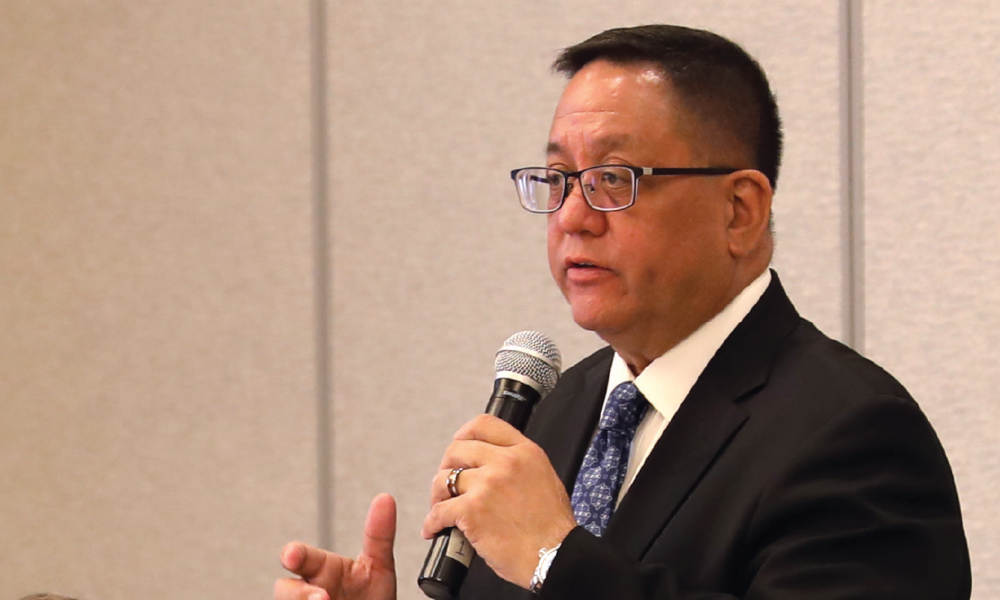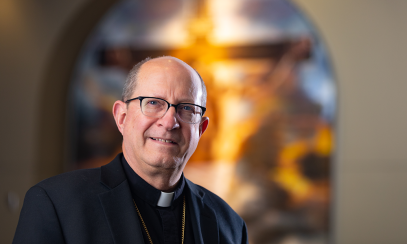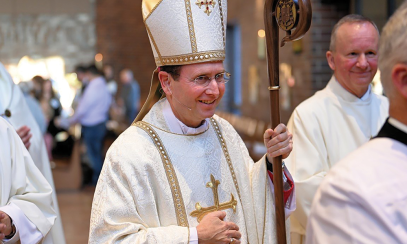
Now is the TIme to Deepen Our Relationship With Jesus
Deacon Bernard Nojadera serves as executive director of the USCCB Secretariat of Child and Youth Protection, created by the Dallas Charter in 2002. The mission of the office is to assist each diocese and eparchy (Eastern-rite churches) in implementing Safe Environment programs designed to ensure necessary safety and security for all children as they participate in church and religious activities, develop an appropriate compliance audit mechanism to assist the bishops and eparchs in adhering to the responsibilities set forth in the Charter, and prepare a public, annual report describing the compliance of each diocese and eparchy to the Charter’s provisions.
Deacon Bernard Nojadera serves as executive director of the USCCB Secretariat of Child and Youth Protection, created by the Dallas Charter in 2002. The mission of the office is to assist each diocese and eparchy (Eastern-rite churches) in implementing Safe Environment programs designed to ensure necessary safety and security for all children as they participate in church and religious activities, develop an appropriate compliance audit mechanism to assist the bishops and eparchs in adhering to the responsibilities set forth in the Charter, and prepare a public, annual report describing the compliance of each diocese and eparchy to the Charter’s provisions.
Dcn. Bernie was a keynote speaker at FAITH Catholic’s annual client meeting in May. He enlightened diocesan communicators about their roles in ensuring transparency and accountability in diocesan communications. Content Evangelist asked Dcn. Bernie for his insight about the unique role of Catholic communicators in the face of the abuse crisis.
CE: How would you define the responsibilities of a diocesan communicator today? Has the role changed from one of promoting the bishop/diocese to a position of holding the bishop accountable? Is that the appropriate role for the communications director of a diocese?
DCN. BERNIE: In the context of the child abuse crisis in the Church, Article 7 of the Charter for the Protection of Children and Young People cites that “dioceses/eparchies are to be open and transparent with the public about sexual abuse of minors by clergy….” The role of a diocesan communicator is to speak the truth. When appropriate, the diocesan communicator reassures the faithful of the diocesan policies and procedures in place that allow for safe environments, allow for allegations to be reported and promptly and competently acted upon.
There has been a shift in core values and priorities. Before, the rule was to avoid scandal at all costs. This put the Church first. Currently, it is the survivor/victim who is the priority. There is a reason that the first article in the Charter is outreach to survivors/victims. Diocesan communications directors in a number of dioceses share in being the primary spokesperson for the diocese when reporting abuse to the public. Additionally, the chair of the diocesan review board or independent board, as well as the director of the office for protection, may participate in communicating diocesan policies.
CE: How can communicators assure that the needs and feelings of victims are considered in diocesan communications? What do victims need to read/hear that might promote their healing?
DCN. BERNIE: All of God’s people need to know how much they are unconditionally loved. Survivors need to know that they are being listened to, and that everything is being done so that another person is not abused in the future. Survivors, and the entire Church, are in pain, are hurting. If we are to be successful in bringing about healing and reconciliation, the damage done needs to be out in the open. There can be no more secrets.
I would also like to add the importance of relationships. I have often asked survivors their thoughts, their opinions. I have asked survivors for direction and guidance. The only way I am able to do this is by having relationships with those I am working with and ministering to. This journey of healing and reconciliation is a journey of accompaniment. It is a ministry of presence and acceptance. It is very important to be able to let a survivor know that the abuse was not their fault! We must say, “No one had a right to hurt you. It is not your fault. God loves you. Always has. Always will.”
CE: How can diocesan communicators balance the need for complete transparency in conveying the failings of some Church leaders/priests with a desire to protect leaders/priests who are innocent of any wrongdoing?
DCN. BERNIE: The key word here is “balance.” There needs to a careful balance regarding transparency and allegations with the presumption of innocence for an alleged accused cleric. Article 7 of the Charter adds it must be “within the confines of respect for the privacy and the reputation of the individuals involved. This is especially so with regard to informing parish and other church communities directly affected by sexual abuse of a minor.” Article 5 adds that “a priest or deacon who is accused of sexual abuse of a minor is to be accorded the presumption of innocence during the investigation and all appropriate steps are to be taken to protect his reputation.” If the allegation is not substantiated, every possible means is to be taken to restore the cleric’s good name, should it have been harmed. Proper balance is achieved when the rights of the alleged accused and the alleged accuser are considered.
CE: The vast majority of abuse cases now being disclosed to the public occurred decades ago. How should dioceses approach the disclosure of this information given that many offending priests have died?
DCN. BERNIE: When dioceses ask me questions like this, I always ask, “What do your diocesan policies say?” Typically, an investigation can still occur if the alleged accused is deceased. There are some dioceses that publicly list cleric names who’ve been accused, and some that list only those whose allegation has been proven credible and substantiated. The transparent action of listing names has encouraged possible victims to come forward for healing.
It is imperative that dioceses carry out their policies, procedures and protocols when receiving allegations—even historical allegations. There is credibility to an organization when policies are consistently carried out. Thus far, many dioceses have done this well when making disclosures.
CE: Some diocesan communicators feel betrayed by their bishops and by the Church they have worked for and dedicated their professional lives to. They may also feel that they, too, are under a microscope of undeserved scrutiny and suspicion, simply because their jobs sometimes require them to speak for the Church. How can communicators come to terms with their personal disappointment and disgust over sexual abuse in the Church?
DCN. BERNIE: Remember that only God knows our hearts, and the only meaningful judgment is the final judgment. We can also remember that it’s at times when we feel betrayed and abandoned when Jesus is closest to us. How closely is our suffering tied to his own Passion in those times of suffering? He is there with us, helping us to carry our cross.
It is also important to remember that what we are dealing with in this crisis is the dark side—is evil. God has a plan. I know that my time will come and go. The problem will still exist. We are simply human. We are also faithful. That is why we commit ourselves daily to do our best in all that we do.
CE: How can communicators use this crisis in their journeys of discipleship? What concrete steps can they take to become closer to Jesus Christ, even though his Church has failed?
DCN. BERNIE: This is where we arm ourselves with every possible means to gain the upper hand in dealing with this evil. So, stay close to the sacraments. Rely on frequent confession, reception of the Eucharist, adoration of the Blessed Sacrament. Praying the rosary, meditating and daily reading of Scripture puts us in tune with holiness and allows us to be in the presence of the Divine. I feel that now is the best time to be involved in the Church. We are able to share the sacraments of reconciliation, extend hospitality and forgiveness. Now is the time to deepen our relationship with Jesus because people will continue to fail us. God will not. Make sure your life is in balance. Get your exercise, pursue hobbies, eat right, get enough sleep. Take care of yourself. Take care of your family. We are needed to battle this evil and you will fight the way you train. So, train hard now so that we will be able to battle to the end in victory. May everything that we do give God glory, honor and praise!



